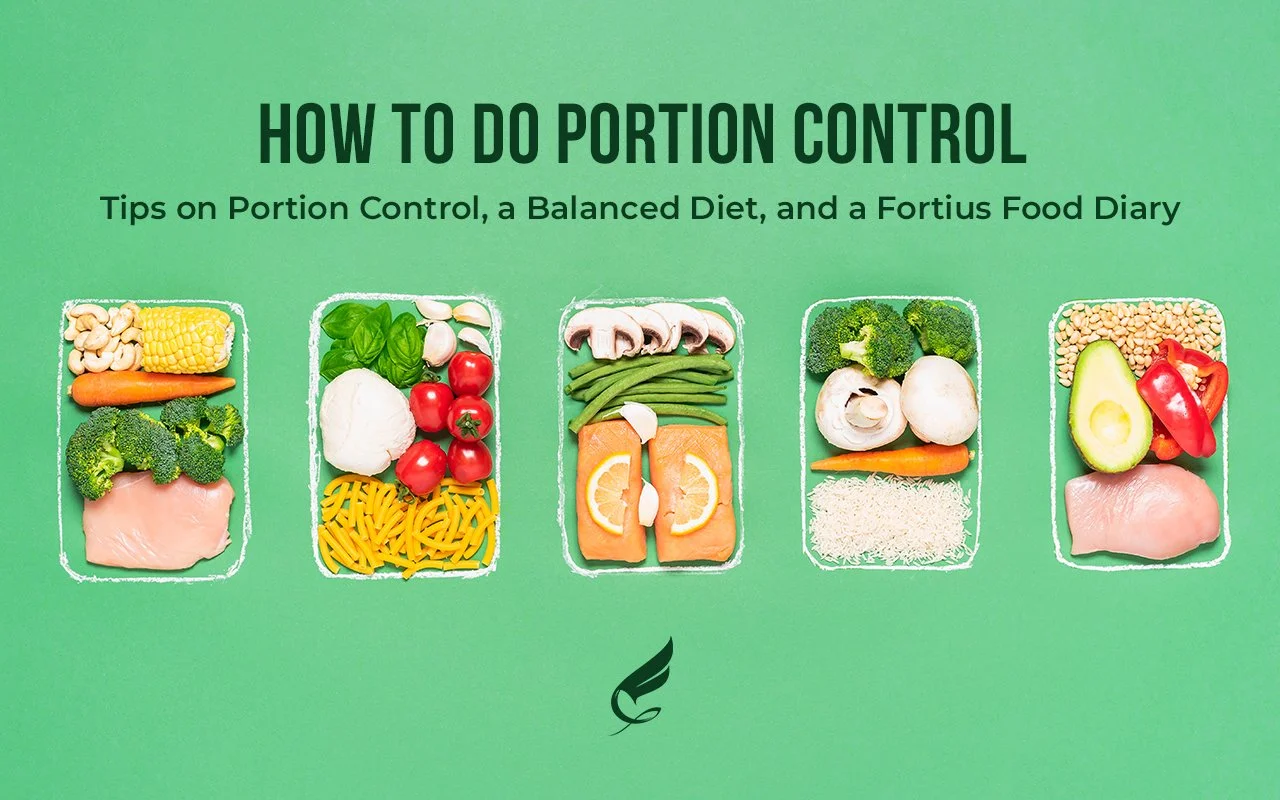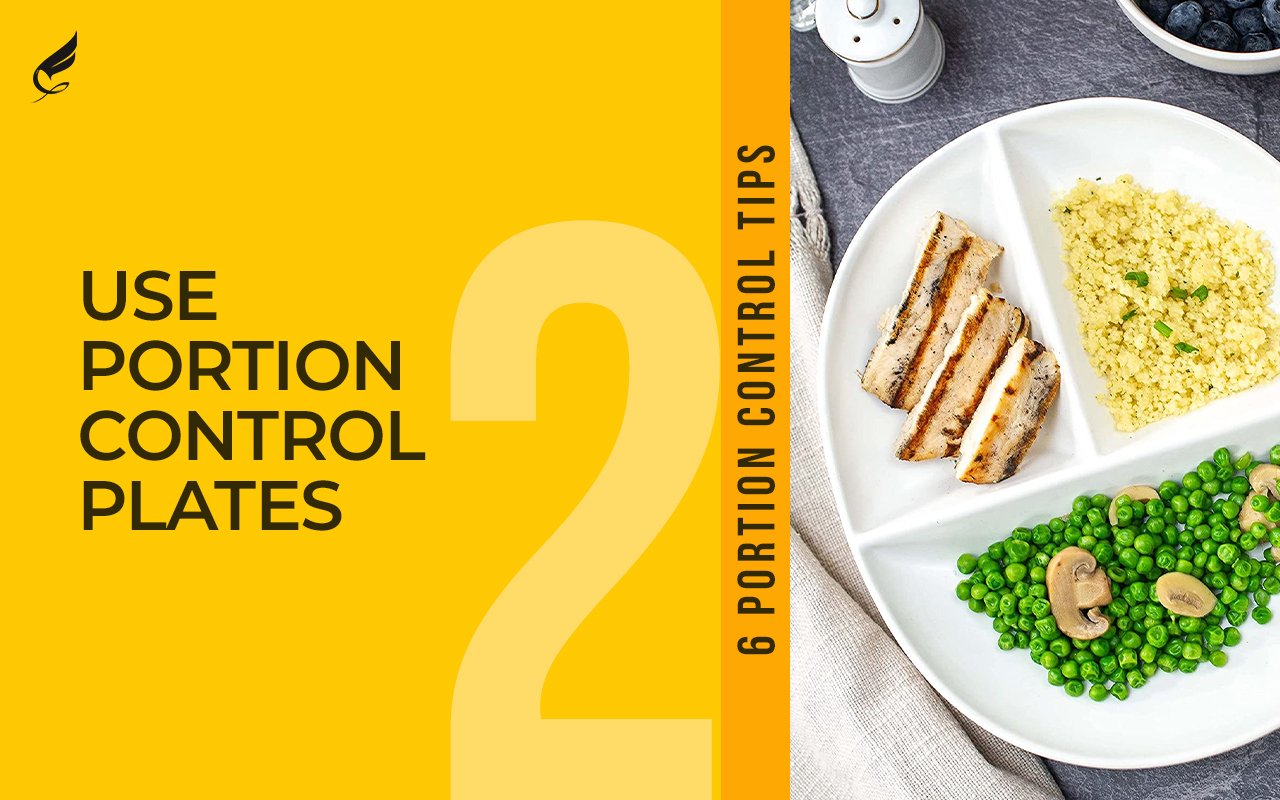Find Out How to Portion Control & What Is the Adequate Portion Size for You?
Tips on Portion Control, a Balanced Diet, and a Fortius Food Diary
Achieve a healthy weight and feel great by using portion control. It's all about eating the right amount of food for your body. This can be tricky, especially if you're not sure what an adequate portion size is. We provide a FREE Fortius Food Diary to help create a healthy eating plan that works for you! We've put together these tips on portion control and a balanced diet.
WHAT IS PORTION CONTROL?
Portion control is controlling the amount of food you eat by measuring or weighing your food. It can be helpful for people who want to lose weight, maintain their weight, or manage a chronic disease such as diabetes. There are many ways to measure portion sizes, and it is essential to find one that works for you.
HOW TO KNOW WHAT IS THE ADEQUATE PORTION SIZE FOR ME?
There is no one-size-fits-all answer to this question. The best way to determine what portion size is right for you is based on your goals. If you're trying to lose weight, you will want to eat less than you currently do. If you're trying to maintain weight, you'll want to eat the same amount of food you now eat. And if you're trying to gain weight, you'll need to eat more food than you are burning. One of the tools that can help you identify your goal is the Body Mass Index (BMI). It is all about calories in and out, so portion size is key to achieving goals!
6 PORTION CONTROL TIPS
KNOW YOUR GOALS
As we said, if you know your goals, you'll know your portion control. It is often as simple as calories in and calories out. So, the first step is to know your goals.
USE PORTION CONTROL PLATES
There are many portion control plates and tools available that can help you measure food. Find one that works for you, and use it consistently.
MEASURE ALL THE FOODS
Use a food scale or measuring cups, spoons, or tools to measure your food. This will help you get an accurate portion size.
MAKE SURE YOU ARE EATING SLOWLY
Pay attention to your hunger cues. It is crucial not to rush when you eat. Your brain needs 20 minutes to register that you're eating. So, take your time and savor your food.
WEIGH YOURSELF REGULARLY
This is an excellent way to track your progress and ensure you're on track to reach your goals. Just keep in mind to get your calories from nutritious foods.
USE A FOOD DIARY
That said, you're one way closer to downloading a Fortius Food Diary that will help you daily. This is a great way to track your eating and how much you eat. It can also help you identify any patterns in your eating.
Here’s a very simple document you can download to start your journey!
What does our Life Coach, Andjela Tanasic, say about Portion Control?
"Portion control is about being mindful of how much food you eat. It's not about depriving yourself; it's about eating the right amount of food for your body. Portion control is a key part of a balanced diet and can help you reach healthy well-being. The most simple tip I give to my clients is to eat when they are hungry, not when they are bored. Many people eat during an emotional crisis, which we ensure we cover in our Mentorship programs. It is all about portion control and control of your mind and body."
WHAT IS A BALANCED DIET?
A balanced diet is a diet that includes all of the major food groups in the proper proportions. The primary food groups are carbohydrates, proteins, fats, vitamins, and minerals. A balanced diet is vital because it helps you get the proper nutrients. It is also essential to eat a variety of foods so that you don't get bored with your diet.
However, avoiding certain foods is beneficial if you are food-sensitive or have allergies. An example could be people with gluten sensitivity.
No matter how much gluten they try to eat for their body to "get used to," they will always face the same symptoms; avoiding it makes them feel better. The same goes for people with lactose intolerance- they feel better when they avoid dairy products.
There are many different ways to eat a balanced diet, and there is no one right way. Finding a way of eating that works for you and that you can stick to long-term is crucial.
If you need help eating a balanced diet, you can use a FREE consultation with one of our nutritionists. They can help you create an eating plan.
CONCLUSION
To sum up, portion control is vital when it comes to weight management, but knowing what portion size suits you best is also important. A balanced diet is essential for good health; a food diary can help determine what works best for you.
Please contact us if you need help with portion control or starting a balanced diet.
Want to learn more about weight loss, muscle building, nutrition, and supplements so you can take control of your fitness journey?
Check out the most comprehensive health and fitness blog in UAE:
To find out more about our services, check out:
#StayStrong #BeFortius











